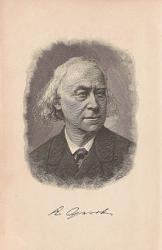
1815 - 1890 Person Name: K. Gerok Author of "Der Heiland ist gekommen" in Sonntagsschulharfe Gerok, Karl von, D.D , was born January 30, 1815, at Stuttgart, and studied theology at the University of Tubingen. He was, from 1836 to 1840, assistant at his father's church in Stuttgart; 1840-43, lecturer (repetent) at Tübingen, and after 1844 diaconus at Böblingen, near Stuttgart. In 1849 he returned to preach at Stuttgart, where he now resides (1886), as chief court preacher and oberconsistorialrath (0. Kraus, 1879, p. 165: manuscript from Dr. von Gerok, &c).
Gerok is well known as an eloquent preacher, and has published various volumes of sermons. His fame principally rests on his sacred poetry. The best known of his poetical works is his Palmblätter, 1857, which has attained a wonderful circulation, and reached a 56th edition in 1886. A new series appeared in 1878 as Palmblätter Neue Folge (9th ed., 1885, under the title Auf einsamen Gängen). A series of poems on the Book of the Acts of the Apostles appeared as Pfingstrosen, 1864, (8th ed. 1886). His other poetical works are, Die letzte Strauss, 1885 (5th ed., 1886), Blumen und Sterne, 1867 (11th ed., 1886), and Deutsche Ostern, 1872(6th ed., 1883). The Palmblätter is in four parts: pt. 1 consisting of poems on Holy Words, i.e. mostly founded on sayings of Holy Scripture; pt. ii. on "Holy Times" (Advent, &c); pt. iii. on "Holy Mountains," and pt. iv. on "Holy Waters," i.e. on Mountains and Waters mentioned in Holy Scripture. From it a few centos have passed into some of the recent German hymn-books; and a version apparently including translations of all the poems in the ed. of the German used appeared in English as Palm leaves by Karl Gerok. Translated from the German by J. E. A. Brown. London: Strahan & Co., 1869. A large number of the individual poems have also been tr, by Miss Borthwick (who has also translated a few from the Pfingstrosen), Miss Burlingham, the Revs. Dr. R. Maguire, E, Massie, J. Kelly, and various others. But as none of these versions have passed into English common use, and as the originals are poems and not hymns, we must refer the reader to the works of these translators.
[Rev. James Mearns, M.A.]
-- John Julian, Dictionary of Hymnology
Karl Gerok


 My Starred Hymns
My Starred Hymns



